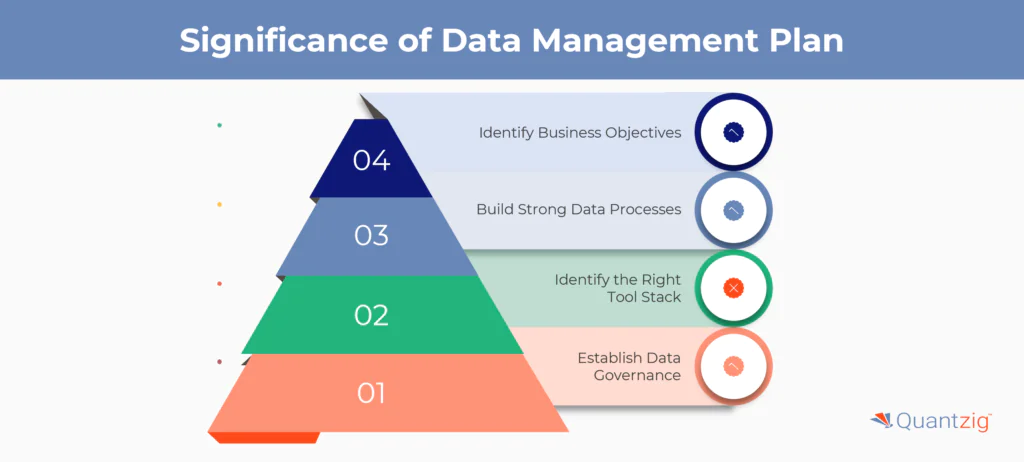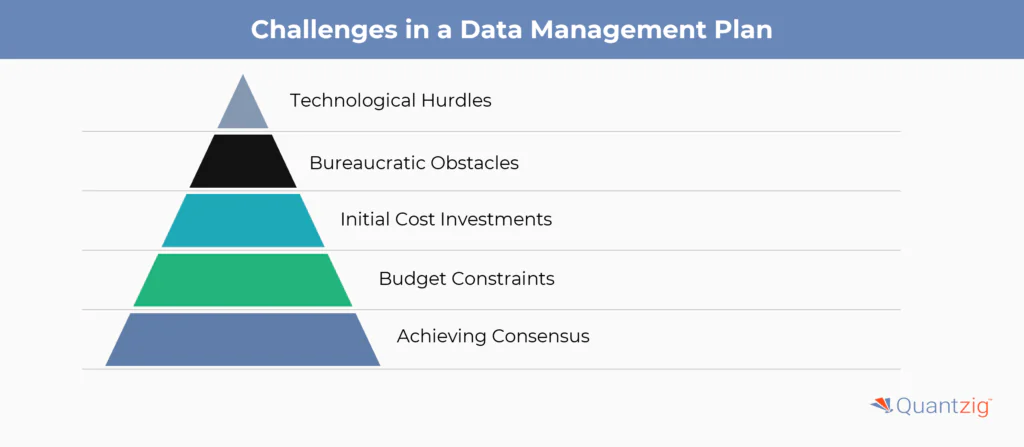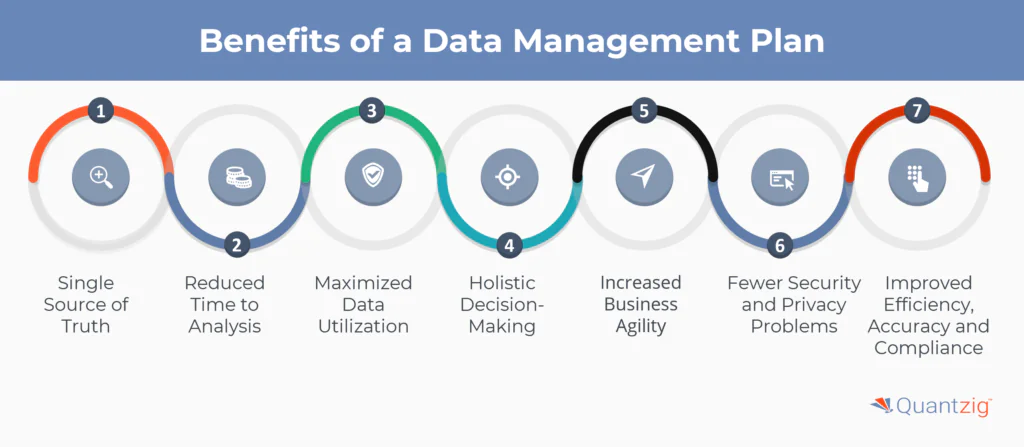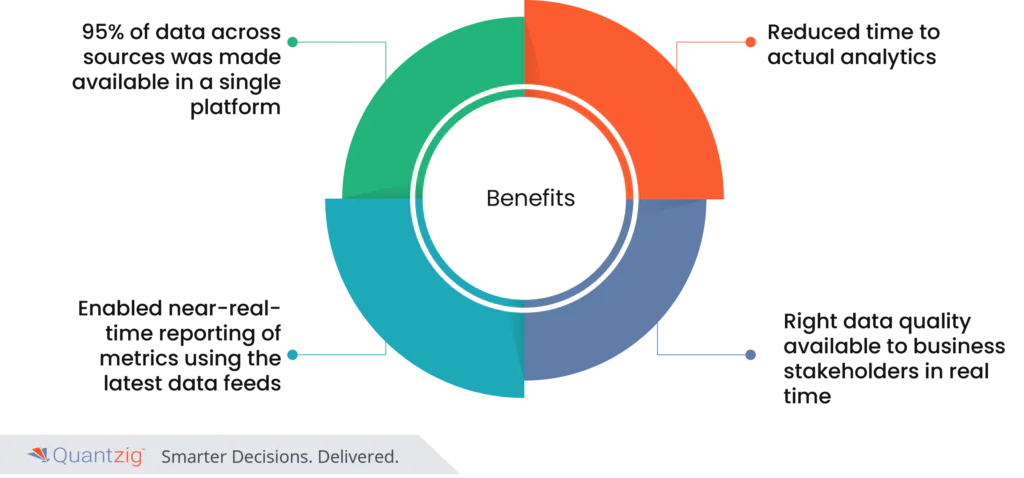Table of Contents
Table of Contents
- Introduction to Data Management Plan for Business
- What is a Data Management Plan for Business?
- Importance of Data Management Plan to Drive Business Growth
- Potential Challenges in Implementing a Data Management Plan
- Key Benefits of a Successful Data Management Plan for Business
- Quantzig’s Expertise in Data Management Plan
- Conclusion
Author: Associate Vice President, Analytics and Data Strategy, Quantzig.
Introduction to Data Management Plan for Business
In today’s data-driven business landscape, effective data management is crucial for organizational growth and success. Our article explores essential strategies and best practices to harness the full potential of data assets. We guide you through developing a comprehensive data management plan that ensures data integrity, security, and compliance while leveraging data to drive business expansion.
Covering key aspects like data governance, technology selection, and fostering a data-driven culture, our insights are tailored for organizations of all sizes and industries. By following our guidelines, businesses can unlock opportunities, streamline operations, enhance customer experiences, and achieve sustainable growth. Explore the transformative power of effective data management with us.
Book a demo to experience the meaningful insights we derive from data through our data management planning analytical tools and platform capabilities. Schedule a demo today!
Request a Free DemoWhat is a Data Management Plan for Business?

A data management plan (DMP) for a business is a strategic document outlining how an organization will handle its data throughout its lifecycle. This plan includes procedures for data collection, storage, maintenance, and sharing, ensuring data integrity, security, and accessibility. It defines roles and responsibilities, sets standards for data quality and governance, and ensures compliance with legal and regulatory requirements. The DMP aims to maximize the value of data assets, streamline operations, support decision-making, and ultimately drive business growth.
Importance of Data Management Plan to Drive Business Growth

In the modern business, the sheer volume of data is no longer enough to guarantee success. What truly sets thriving enterprises apart is their ability to strategically harness this data. To achieve this, organizations must develop a robust Data Management and Sharing Plan that encompasses essential elements such as Data Security, Data Safety, Storage, and handling of Sensitive Data.
- Identify Business Objectives: Ensure data initiatives align with strategic goals by defining KPIs and objectives, pinpointing necessary data for decision-making and growth.
- Build Strong Data Processes: Implement data collection, storage, and integration methods to maintain data quality and accessibility, including cleaning, transformation, and validation.
- Identify the Right Tool Stack: Select tools and technologies for data storage, analytics, and visualization that match organizational needs, evaluating software, hardware, and cloud solutions.
- Establish Data Governance and Quality Management Framework: Set rules for data management, including ownership, access controls, and compliance, while ensuring data accuracy and consistency for reliability and trustworthiness.
By adopting these measures, businesses not only optimize their current operations but also lay the foundation for future growth and innovation. They create a culture of responsible data ownership and data archiving, fostering trust among stakeholders and enabling agile responses to market changes. In this way, organizations can transform data from a mere commodity into a strategic asset, driving continuous improvement and adaptation in today’s dynamic business environment.
Potential Challenges in Implementing a Data Management Plan

- Technological Hurdles: Integration of existing systems, compatibility issues, and the need for substantial investments in new infrastructure and tools.
- Bureaucratic Obstacles: Organizational silos, varying departmental priorities, and resistance to change.
- Initial Cost Investments: Acquisition of data technologies, resources for data governance and quality assurance, and the need for skilled personnel.
- Budget Constraints: Financial limitations and perceived risks associated with initial investments.
- Achieving Consensus: Difficulty in reaching a unified agreement on the best approach to data management across the organization.
Key Benefits of a Successful Data Management Plan for Business

Key benefits of a successful data management plan in today’s business landscape are manifold, as organizations navigate the complexities of a data-rich environment. At the core of such a plan lies the strategic utilization of data, where Data Security and Data Safety serve as the bedrock, ensuring the protection and integrity of valuable information assets. By implementing robust Storage solutions and effectively handling Sensitive Data, businesses not only safeguard against risks but also unlock opportunities for innovation and growth.
An effective data management plan yields a multitude of key benefits that are invaluable to organizations in today’s data-centric world:
1. Single Source of Truth:
By implementing a Data Management Plan Review Service, organizations establish a centralized data repository where they collect and manage data, ensuring appropriate data collection and access. This repository serves as a single source of truth for the organization, ensuring consistency and reliability in the timing of data, as well as clarifying data ownership.
2. Reduced Time to Analysis:
By implementing robust data management strategies such as the utilization of a Data Management Plan Review Service, organizations optimize the process of data collection and access within a centralized data repository. This streamlined approach reduces the timing of data processes, ensuring efficient handling by designated data owners.
3. Maximized Data Utilization:
A well-executed Data Management Plan Review Service ensures that all available data sources are effectively harnessed. This means that no valuable information goes untapped, leading to a more comprehensive understanding of business operations, customer behaviors, and market trends.
4. Holistic Decision-Making:
Insights derived from multiple data sources create a holistic and well-rounded picture of an organization’s operations and environment. This comprehensive perspective allows for more accurate and informed decision-making, as it considers various factors that may impact the business.
5. Increased Business Agility:
Organizations with well-managed data can become more agile, enabling them to spot market trends and take advantage of new business opportunities more quickly.
6. Fewer Security and Privacy Problems:
Effective data management can help companies avoid data breaches, data collection missteps and other data security and privacy issues that could damage their reputation, add unexpected costs and put them in legal jeopardy.
7. Improved Efficiency, Accuracy and Compliance:
Proper data management reduces risks associated with non-compliance by ensuring that all records are up-to-date and adhere to necessary regulations. It also helps streamline processes and saves money in the long run.
In essence, an effective data management plan not only ensures the accessibility of data but also establishes an AI-centric data architecture that facilitates efficient Access, Sharing, and Re-use of information. By employing appropriate Tools and Software, organizations can navigate ethical concerns surrounding copyrighted material, licensed material, and patents, while adhering to technology licensing agreements and embargoes.
Quantzig’s Expertise in Data Management Plan for A Leading US-Based Manufacturing Company
| Category | Details |
|---|---|
| Client Details | A leading USA manufacturer faced challenges in managing and utilizing data effectively for informed decision-making due to siloed data sources, data quality issues, and lack of centralized governance. |
| Challenges Faced by the Client | The client faced significant delays in decision-making due to time-consuming data organization for analytics, hindering operational efficiency and resulting in revenue losses. |
| Solutions Offered by Quantzig | We achieved 95% data integration from diverse sources into a single platform, enhanced documentation and metadata practices, and significantly reduced the time required for analytics. This enabled efficient data handling, near-real-time reporting, timely decision-making, real-time data quality access for stakeholders, and a clear Data Management Plan to meet funder requirements, safeguard IP rights, and ensure compliance. |
| Impact Delivered | Quantzig’s research and insights enabled the client to direct its marketing spend toward the correct variables and increase its RoI by 43%. |
Client Details:
A leading manufacturer in the USA faced significant challenges in managing and utilizing their data effectively for informed decision-making. Siloed data sources, data quality issues, and a lack of centralized governance hindered their growth and competitiveness. They sought a data management solution that would streamline their data processes and harness the full potential of their data assets.
Data Management Challenges Faced by The Client:
The client faced significant delays in decision-making due to the time-consuming process of organizing fundamental data for analytics. This bottleneck not only hindered their operational efficiency but also resulted in revenue losses. Recognizing the urgency for improvement, the client aimed to establish a centralized data ecosystem. This strategic move aimed to expedite data access for analysis, reduce the time to insights, and propel the organization forward on the analytical maturity curve. Such a transformation not only enhances data-driven decision-making but also positions the client to harness the full potential of their data assets for sustainable growth and competitive advantage.
Experience the advantages firsthand by testing a customized complimentary pilot designed to address your specific data management requirements. Pilot studies are non-committal in nature.
Request a Free PilotQuantzig’s Data Management Solutions:
In our engagement with the client, we undertook a comprehensive approach to address their data management challenges and drive data-driven decision-making.
- Assessed the client’s existing data maturity level to understand their current data landscape and identify strengths and weaknesses
- Mapped multiple data sources to ensure no valuable data went untapped
- Collaborated with the client to quantify specific business objectives and align data initiatives with their strategic goals
- Recommended an ideal tool and technology roadmap for building a Data Lake to enable efficient data storage, retrieval, and analytics
- Deployed data engineering skills to implement an end-to-end data management roadmap, including seamlessly integrating various data sources into a unified ecosystem
- Established centralized data governance and data quality management frameworks to ensure the reliability and accuracy of the data
- Implemented automated machine learning-based rules and custom workflows to proactively identify and rectify data errors, guaranteeing high-quality, business-ready data was consistently available to stakeholders
In essence, our approach not only addressed the client’s immediate data challenges but also positioned them for sustainable growth by optimizing data utilization, enhancing decision-making capabilities, and fostering a culture of data-driven excellence throughout their organization.
Impact Delivered:

- Successful integration of data from diverse sources into a single platform, reaching an impressive 95% consolidation
- Enhanced documentation and metadata practices, ensuring comprehensive information management throughout the document lifecycle
- Significant reduction in the time required for actual analytics, enabling organizations to swiftly derive insights from their data
- Efficient handling of the influx of data and expedited access and reuse for analytical purposes through the use of advanced technologies like Scale AI workloads
- Near-real-time reporting of metrics using the latest data feeds, showcasing the effectiveness of storage and management strategies in enabling timely decision-making
- Availability of the right data quality to business stakeholders in real time, reducing dependency on IT or data management teams and empowering stakeholders to access and utilize data without hindrance
- Defined Data Management Plan (DMP) outlining clear roles and responsibilities, ensuring alignment with corporate environment structures and governance teams
- Ability to address funder requirements and safeguard intellectual property rights while maximizing the potential for data dissemination and sharing
- Holistic approach to data management that fosters business agility, mitigates risks, and ensures compliance with regulations governing personally identifiable information (PII) and third parties
Get started with your complimentary trial today and delve into our platform without any obligations. Explore our wide range of customized, consumption driven analytical solutions services built across the analytical maturity levels.
Start your Free TrialConclusion
A robust Data Management Plan (DMP) is essential for businesses to effectively manage and utilize their data. By leveraging a DMP tool, organizations can streamline data storage methods and establish strong data governance initiatives. This ensures the integrity and security of data systems while addressing privacy and confidentiality issues. Implementing efficient data backup methods and using Digital Object Identifiers (DOI) enhance data accessibility and reliability. Integrating AI workflows in business settings and utilizing the Internet of Things (IoT) further optimizes business outcomes from data systems. Ultimately, a well-crafted DMP supports sustainable growth through improved data sharing and management practices.



